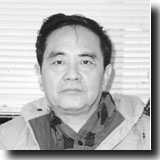 Born: 1932, Beijing. Died: 1997, Taipei.
Born: 1932, Beijing. Died: 1997, Taipei.Moved to Taiwan, from the Shaw Brothers production company in Hong Kong, where he was not on favourable terms.
It was King Hu who brought a new focus on a stylised kind of action in wuxia films, even introducing the credited role of “martial arts director” or fight choreographer as an official job description.
King Hu was from Beijing and incorporated many techniques from the capital’s opera stage. He too was a teacher of sorts, being an avid scholar of Ming dynasty literature, history, and the arts. Drawing on this knowledge, he injected period accuracy but, unlike his friend and mentor Li Hanxiang, accelerated the pace of movement and editing in action sequences.
King Hu’s martial arts style adds a large dose of athleticism in addition to grace. To make fight scenes look dynamic—fast, efficient, lethal—he used hidden springboards and trampolines to add power to combatants’ leaps. Wide-angle shots, swish pans, and rapid tracking are employed to enhance involvement with the total action, lending panoramic views to the surrounding space as well as the combatants. These are mixed with close-ups of only a few seconds, inserted to suggest the blinding impact of a body blow. He was also very dedicated to the historical accuracy of even the smallest details in his period productions.
King Hu was not really interested in kung fu or swordplay except insofar as it illuminates practices of Ming dynasty intrigue. Themes are equally classical, rendering but not dwelling on conflicts of good and evil, or the rigors of acquiring knowledge, intelligence, and (occasionally) enlightenment. The transcendent epiphany of Zen Buddhism is powerfully expressed at the end of A Touch of Zen, but this is an anomaly; the later pictures have the mystical, specifically Chinese atmosphere of Touch of Zen but lack the explicit visualization of religious power.
With the phenomenal success of Dragon Inn, Union Pictures and Hu signed up to do A Touch of Zen, and though Hu continued to work with Union, relations were increasingly strained. Hu was working at an unprecedented scale and expense on what would become his mystical epic A Touch of Zen. Continuing interference and nagging from Union producers prompted Hu to move postproduction on the film back to Hong Kong. From there, he eventually sent a director’s cut to Cannes, where he received a special award for technical achievement. The prestigious recognition—foreshadowed by Li Hanxiang’s Cannes prize for his Yang Kwei-fei (1962)—allowed Hu to earn an international reputation no other Chinese directors enjoyed. By then, King Hu had severed ties with Union and moved his production base back to Hong Kong. When he did return to Taiwan in the early 1980s, the films he made—The Juvenizer (Zhongshen dashi, 1981), All the King’s Men (Tianxia diyi, 1982), The Wheel of Life (Da lunhui, 1983)—no longer generated much impact or new sensations. King Hu’s historical archaism yielded to a different historical authenticity coming from the New Cinema movement.
Quotes:
"Some people say I come from the kung fu genre; that’s a mistake. I know nothing about kung fu. Action sequences in my films are neither kung fu nor martial arts, neither judo nor karate. In fact, they are just two fighters dueling, a form of dance. . . . Because I was exposed to Beijing opera when I was little, my action sequences are not real fights. They are “wuda,” [stage combat] in Beijing opera. There’s no such term as “kung fu” in the Beijing dialect. This is a Cantonese term used by Hong Kong people as a synonym for martial arts. In fact, Dragon Inn belongs to a kind of ancient Chinese espionage. It was made to respond to the prevalent James Bond 007 spy genre. The Ming dynasty is the era that has the strongest concentration of spies. They were controlled by eunuchs that were so powerful that they were immune from imperial authority. Dragon Inn is full of suspense and intrigue, and this is why it appealed to the audience."
